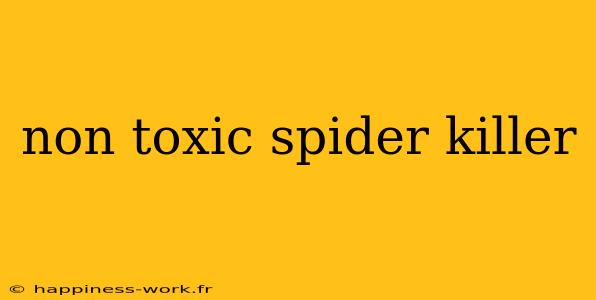Spiders can be beneficial for your ecosystem as they help control pests. However, when they invade your home, they can evoke fear and anxiety. If you're looking for effective yet non-toxic ways to eliminate spiders without relying on harsh chemicals, this article is for you.
Understanding the Need for Non-Toxic Solutions
Many commercial spider repellents contain toxic substances that can harm not just spiders but also pets and humans. For families looking to maintain a safe living environment, exploring non-toxic alternatives is essential.
Why Go Non-Toxic?
- Health Concerns: Toxic pesticides can affect respiratory health, especially in children and pets.
- Environmental Impact: Non-toxic solutions reduce the chemical load in our environment.
- Effectiveness: Many natural ingredients are surprisingly effective at repelling pests.
Natural Ingredients to Create Your Spider Killer
Here are some non-toxic ingredients you can use to create your own spider-killing solution:
1. Essential Oils
Peppermint Oil: Spiders dislike the strong scent of peppermint. Diluting peppermint oil with water can create an effective spray.
- How to Use: Mix 1 teaspoon of peppermint essential oil with water in a spray bottle. Spray areas where spiders are likely to hide, such as corners, closets, and windowsills.
2. Vinegar
White Vinegar: This common household item can effectively repel spiders.
- How to Use: Combine equal parts of vinegar and water in a spray bottle. Spray it around entry points and where you see spider webs.
3. Diatomaceous Earth
Food Grade Diatomaceous Earth: This natural powder can kill spiders by damaging their exoskeleton.
- How to Use: Dust a thin layer of diatomaceous earth in corners or areas where spiders frequent. Be cautious around pets, as inhalation can be harmful.
4. Soap Solutions
Dish Soap: A mixture of dish soap and water can suffocate spiders.
- How to Use: Mix a few drops of dish soap with water in a spray bottle and spray directly on the spiders when you see them.
Practical Example of a Non-Toxic Spider Killer Recipe
Here’s a step-by-step guide to creating your own spider-repelling spray:
Ingredients:
- 2 cups of water
- 1 teaspoon of peppermint oil (or any other essential oil you prefer)
- 1 tablespoon of dish soap
Instructions:
- Combine the water, essential oil, and dish soap in a spray bottle.
- Shake well before each use.
- Spray the mixture around potential entry points and areas where you frequently see spiders.
Additional Tips for Spider Control
- Declutter Your Home: Spiders love hiding in dark, cluttered spaces. Regular cleaning and decluttering can minimize their hideouts.
- Seal Entry Points: Inspect your home for cracks and gaps and seal them. This helps prevent spiders from entering.
- Natural Predators: Consider attracting natural spider predators such as birds or certain insects that feed on spiders.
FAQs on Non-Toxic Spider Killers
Q: Are non-toxic spider killers safe for pets?
A: Yes, non-toxic solutions like essential oils and vinegar are generally safe for pets. However, avoid using diatomaceous earth where pets may inhale it.
Q: How long do these natural solutions last?
A: Natural spider repellents need to be reapplied regularly, especially after cleaning or rain, to maintain effectiveness.
Q: Do I have to worry about allergic reactions to essential oils?
A: Some people may be sensitive to essential oils. Always test the mixture on a small area before widespread application and consult a physician if you have concerns.
Conclusion
Using non-toxic spider killers is an effective way to manage spider populations in your home while keeping your family and pets safe. By leveraging simple household ingredients, you can create a pest-free environment without harmful chemicals.
For more detailed guidance and tips, consider checking out the original article on WikiHow authored by various contributors dedicated to helping you manage pests responsibly.
This article has been optimized for SEO by incorporating relevant keywords like "non-toxic spider killer," "natural spider repellent," and "DIY spider spray," making it easy for readers to find effective solutions for spider control. By combining practical examples with additional insights, the content adds value to those seeking safer alternatives.
